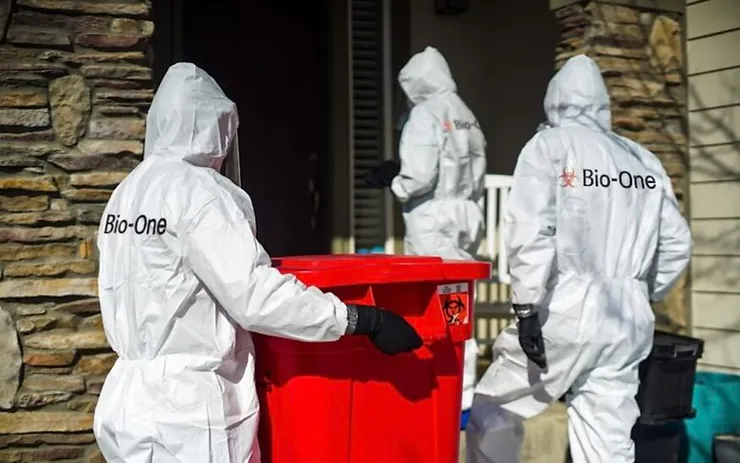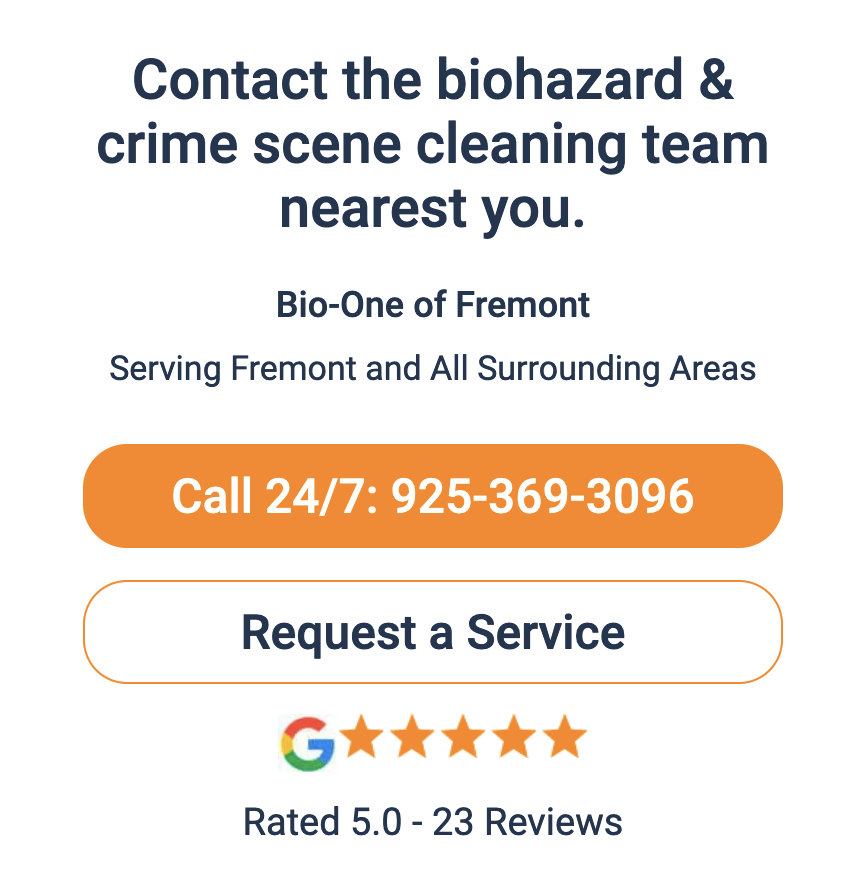Fremont, CA - Family-owned and operated, Bio-One of Fremont is a leader in crime scene cleanup and biohazard decontamination services in Alameda, Contra Costa and Santa Clara Counties.
Whether you need help remediating a crime scene, suicide, or other trauma event in the San Francisco Bay Area, they are ready to answer the call.
Since joining the Bio-One family, Bio-One of Fremont has continually grown and provided a very valuable service to families around the Bay area.
The scenes they remediate are often overwhelming and dangerous, but the crew are trained and experienced and here for you. It is a wonderful service they provide.
Kevin Jameson, owner, states - "We hope you never need our service, but in the case of an unattended death, suicide, or a violent crime, Bio-one of Fremont is here to help families and loved ones so that they do not have to go through additional trauma of cleaning up. Our goal is to allow families to start the grieving and healing process while we restore the property for them".

As a former crime scene technician, Kevin describes that when there is a death, only the body is removed and the family is left with the aftermath. That's where Bio-One helps. Using proper equipment to remove biohazards and medical waste safely in addition to proper PPE and hazmat suits, Bio-One allows the family to safely return to their home.
Most jobs are covered by homeowners insurance, and Bio-One of Fremont realizes that working with an insurance company can be overwhelming during difficult times. Bio-One of Fremont has dedicated staff who work directly with your insurance company from opening a claim to submitting all necessary documentation to close it upon completion.
"Anything trauma scene-related or death-related is typically covered by homeowners insurance so our clients only pay a deductible for our services"
Coordinating with the insurance company allows family members to focus on healing and supports Bio-One of Fremont's motto, "Help First, Business Second"!
A portion of their business is also hoarding. You can find a guide on their website.
They also provide cleaning for people with mental health or mobility issues. Bio-One of Fremont crew members are certified in Mental Health First Aid and have completed additional training with the San Francisco County Department of Mental Health to further assist their clients.
Additionally, Bio-One does cleanouts when residents or tenants leave behind a large mess or odors related to mold, cigarette and cannabis smoke.
Bio-One provides many services and resources which can be found on its website.
They answer the call 24/7 and are here to help you.
Their company vehicles are also unmarked for your privacy.
Bio-One of Fremont has a 5-star rating and have received numerous testimonials which can be found on their website.
Located in Fremont and Livermore, you can reach them by phone at 925-369-3096 or via email at mailto: info@bioonefremont.com
Find them on Facebook at www.facebook.com/bio.one.fremont or visit their website at www.bioonefremont.com.

In the aftermath of a crime, accident, or traumatic event, the cleanup of the scene often falls to specialized professionals trained to handle biohazards and hazardous materials. However, unlike many other industries, crime scene cleanup operates within a regulatory gray area, where oversight and standards vary widely across jurisdictions. This lack of uniform regulation raises concerns regarding safety, service quality, and ethical practices within the industry.
One primary challenge stemming from this lack of regulation is the potential for inconsistencies in training and certification standards among crime scene cleanup companies. While some states may have certification programs or voluntary guidelines, there is no standardized national framework governing the qualifications and training requirements for individuals entering the field. Consequently, there may be disparities in the level of expertise and professionalism among cleanup providers, posing risks to both workers and the public.

Moreover, the absence of regulatory oversight can lead to ethical concerns regarding the exploitation of vulnerable individuals in distressing situations. Without clear guidelines, unscrupulous companies may engage in price gouging, predatory marketing tactics, or substandard practices, taking advantage of clients' emotional vulnerability during times of crisis. This underscores the urgent need for standardized regulations to protect consumers and ensure ethical conduct within the industry.
Furthermore, the lack of regulatory oversight may hinder efforts to enforce health and safety standards in crime scene cleanup operations. Biohazardous materials present significant risks of exposure to bloodborne pathogens, toxins, and infectious diseases, necessitating strict protocols for handling, disposal, and decontamination. Without regulatory mechanisms to monitor compliance with these standards, there is potential for lapses in safety practices, putting both cleanup workers and the public at risk.
In conclusion, the absence of regulation in crime scene cleanup represents a critical gap in oversight that poses risks to safety, service quality, and ethical conduct within the industry. To address these concerns, there is a pressing need for comprehensive regulatory frameworks at the state and national levels, establishing clear standards for training, certification, safety protocols, and ethical practices. By implementing robust regulatory measures, we can ensure that crime scene cleanup operations uphold the highest standards of professionalism, safety, and integrity, providing essential services to communities in times of need.

The roots of crime- and trauma-scene cleaning companies can be traced to the 1990s, and at that time only a dozen or so companies existed. The industry was widely unregulated and awareness of contamination risks were relatively non-existant.
"I was young and dumb and saw something you only see in movies, so I quickly shut the door, took a deep breath, sat on the couch with the widow and told everyone else to get her out of here and take her to lunch, and we’ll clean this up for her," said Nick-Anthony Zamucen, Founder of Bio-One Inc. "We were just trying to help a lady in her greatest time of need, and that’s for me how I got into the crime scene and cleaning business." Read Nick's story in Franchise Times.
Today, there are hundreds of companies that advertise crime and trauma scene cleaning, and a simple Google search may prove overwhelming when you're experiencing one of the most traumatic moments in your life. To help, we've listed pre-qualifying questions to ask before choosing a crime and trauma scene company.
Questions to Ask Before Hiring a Crime and Trauma Scene Cleaner
There are a number of key questions to ask crime and trauma scene cleaning technicians or business owners to properly root out which one is best for your goals and circumstances.
Last but certainly most important, make sure the business you speak with shows care and compassion for your situation. They should want to do everything possible to support you and your loved ones.
If you are searching for a crime and trauma scene cleaner, Bio-One is here for you. All of our offices adhere to our business motto Help First, Business Second and are available 24/7. Click here to search for a Bio-One team near you.